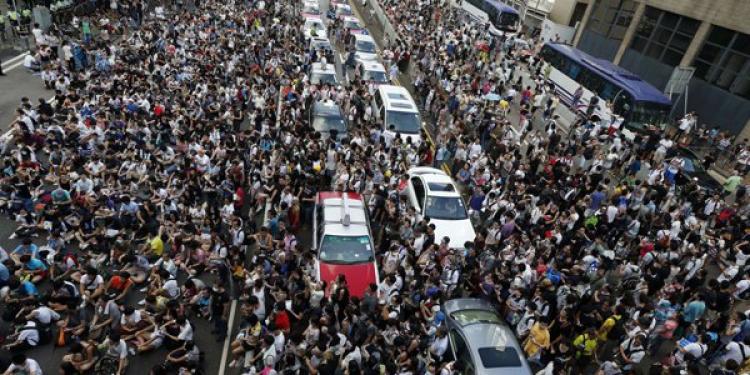How Macau Casinos benefit from Civil Unrest in Hong Kong
Posted: October 14, 2014
Updated: June 4, 2017

Chinese tourists are shying away from politically explosive Hong Kong, while Macau casinos welcome them with open arms.
For the past two week protesters have poured into the streets of Hong Kong demanding the right to free and transparent elections. China and Hong Kong are held together by a “one country, two systems” concept in which the former British colony has a large degree of autonomy but its leadership still must answer to Beijing.
• Macau has welcomed 845,000 tourists since October 1st
• Civil unrest in Hong Kong has led Chinese to shy away from the city
• Macau is popular for shoppers and ordinary tourists as well as gamblers
The protests have come in response to an August 31st announcement that all candidates for the top elected office in Hong Kong would be pre-approved by Beijing. City officials are caught between a rock and a hard place; refusing to give in means ignoring the legitimate demands of Hong Kong’s citizens, while granting free elections is likely to provoke a heavy-handed response from Beijing, as thousands of soldiers from the People’s Liberation Army look on from the mainland.
With Hong Kong in turmoil, things are suddenly looking up for China’s other special administrative zone, nearby Macau. The Asian gambling hub has been caught in a slump over the past three months as a crackdown on corruption on the mainland has led to wealthy public officials shying away from the city’s casinos. A recent decision by the city government to ban smoking indoors hasn’t helped either.
Year-on-year revenue declined for the first time in five years in both August and September, and the share prices of major casino operators Sands China and Wynn China have declined. However, the tension in Hong Kong could be just what Macau needs for a turnaround.
People are ducking Hong Kong to lay low in Macau
People are coming into Macau in greater numbers than they were two weeks ago largely because Hong Kong isn’t seen as a healthy destination in light of the political unrest. Chinese vacationers want to forget about the country’s political problems, not be reminded of them.
During “Golden Week”, a Chinese holiday encompassing the early part of October, many Chinese from the mainland like to take a vacation to either Hong Kong or Macau, with the former being famous for its casinos and both cities being major shopping and entertainment hubs.
But with fewer people interested in Hong Kong, the number of tourists entering Macau has swelled over the past two weeks. In fact, over 845,000 have come since October 1st, a rise of over 17 percent from the same period last year.
After suffering recent declines, casino share prices spiked earlier this week, with Sands China climbing by 7.1 percent and Galaxy Entertainment seeing gains of 6.6 percent.
While many of these visitors are coming for the shopping, not the baccarat or Chinese poker rooms, they are still booking hotel rooms and eating in casino restaurants, putting money into the pockets of casino executives like Sheldon Adelson of Sands, Steve Wynn, and Stanley Ho of SJM Holdings.
One mainland family, Jerry and Jocelyn Lu, recently came to Macau intending to wager only 1,000 yuan at the gambling tables (about $160) but with an overall budget of 30,000 to spend on a plush hotel room and luxury retail items.
Macau is also seeing an influx of “tourism refugees” from Hong Kong itself. Thousands of the city’s residents (mostly older and wealthier people) have no interest in participating in the protests and would rather get out of Dodge until the situation blows over. For those with money to spend, Macau is the most obvious destination.
The journey to Macau from Hong Kong requires only a 60-mile ferry ride, and reports say that the ferries have daily been full of “mass market” gamblers even as high rollers continue to stay away.
What will happen after the holiday?
When Golden Week ends later this month the throngs of tourists, gamblers and shoppers can be expected to return to their homes in Beijing, Nanjing and Shanghai. Should Macau casinos expect to be pushed back into a slump?
Fortunes are looking up in general. There have been indications out of Beijing that the Central Communist Party is ready to ease up on its anti-corruption campaign. If that’s the case, public officials from the mainland will soon consider it safe to hop a plane to Macau and wager hundreds of thousands of dollars at luxury casinos there.
In addition, the region in general still has a lot of room for growth. Macau currently suffers from an over-dependence on “high rollers” from the Chinese mainland, most of whom are ultra-wealthy businessmen and government officials.
But as the country’s economy continues to grow more citizens have the money to take an extended vacation far from home. And given that Chinese gambling laws ban the activity everywhere except Macau, it is the natural destination for many in a country of more than one billion.
Macau casinos have also made an effort to court mass market gamblers, investing in non-gambling amenities like entertainment and activities for children. The city appears to be following the model that Las Vegas used when it transitioned from a high roller destination to an “all-the-above” entertainment hub in recent decades.












